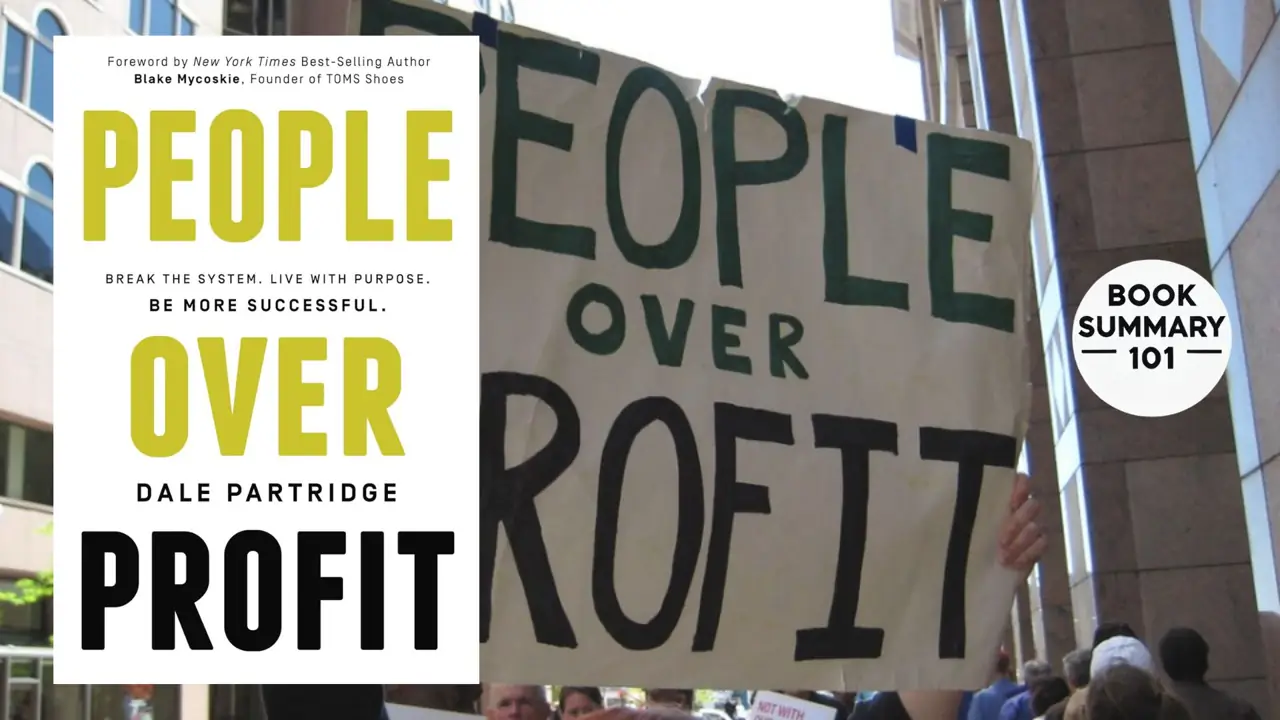We’ve all seen it before: a business that starts with genuine passion and care, only to lose its way, prioritizing profits over people as it grows. This is where People Over Profit by Dale Partridge comes in. Partridge, a seasoned entrepreneur, takes a hard look at the broken system that can push businesses to value dollars over integrity and purpose. He provides a powerful argument for putting people first, whether that means your customers, employees, or even yourself.
In this book, Partridge doesn’t just preach ideals; he lays out practical steps to help businesses keep their values intact while still achieving success. But this isn’t just a “business book.” It’s a wake-up call to anyone who feels burned out by a world where success often seems to come at the cost of personal ethics and human connection.
Let’s dive in to see what People Over Profit offers and how it might just change the way you look at business—and maybe even your purpose in life.
Why Read This Book?
If you’re a business owner, entrepreneur, or just someone trying to find more meaning in your work, People Over Profit can be a game-changer. Partridge isn’t here to promise you overnight success. Instead, he wants to challenge the very foundation of how businesses are run, especially in today’s corporate climate.
He divides the journey into four core stages: Honesty, Efficiency, Deception, and Crisis. His point? Companies often start with a deep sense of purpose and integrity but get stuck in a cycle that pulls them away from their values. His book gives us the tools and mindset to break free of that cycle.
So, why read it? Because whether you’re leading a small startup or working in a corporate setting, this book provides a refreshing reminder of why people should be at the heart of every decision—and how that approach can lead to long-term success, both in business and in life.
The book on amazon 👉 People Over Profit 📚
Breaking Down the Heart of People Over Profit
People Over Profit offers a simple yet transformative approach to business that doesn’t just serve to increase bottom lines but to truly revolutionize how we think about work, leadership, and the legacy we want to leave behind. Let’s break down each of Partridge’s core takeaways in more detail, because each one can help both current and future leaders make decisions that resonate with purpose, integrity, and real impact.
Honesty and Transparency Matter More Than Ever
Partridge argues that we’re living in a world where customers, employees, and communities value honesty as a fundamental trait in a business. Why? Because we’ve seen too many scandals, too many examples of corporate deceit, and it’s eroded trust in companies overall. Businesses that openly communicate their goals, practices, and even struggles create a strong foundation of trust with their audience. It’s about making sure that the brand isn’t a mask but a true reflection of the company’s values.
Imagine a business that not only shares its triumphs but is also upfront about its challenges and shortcomings. Partridge argues that this type of vulnerability creates a sense of authenticity that customers and employees respect. Take, for example, Patagonia’s practice of revealing its supply chain imperfections as part of its transparency about environmental impact. By not hiding the areas where they are working to improve, they’re actually strengthening their brand and customer loyalty. In the end, customers are more willing to support a company that’s honest, even if it’s not perfect, over one that tries to look flawless but lacks integrity.
Avoiding the Short-Term Profit Trap
One of the biggest challenges in any business, especially in its early stages, is the temptation to take shortcuts to achieve quick financial wins. Partridge speaks from experience here: it’s all too easy to prioritize short-term gains over long-term values, but the true cost is often far greater than we realize. Short-term profit boosts can seem tempting when you’re striving to hit financial goals or make an impressive quarterly report, but Partridge argues that these shortcuts usually backfire, hurting employee morale, customer trust, and even the business’s reputation.
Consider a company that cuts costs by lowering product quality or laying off workers without warning to boost profit margins. In the short term, it may look like a success, but in the long term, these actions can lead to negative reviews, customer distrust, and high employee turnover. Partridge encourages leaders to focus on sustainable growth by staying true to the values that attracted people to the business in the first place. His message is clear: the sacrifices you make for short-term profits can erode the integrity and loyalty you’ve worked so hard to build. Instead, keep an eye on long-term value, which often means holding back from quick profits in favor of building a business that will thrive for decades.
Building a Purpose-Driven Culture
Creating a purpose-driven culture isn’t just about crafting a catchy mission statement or a slogan that looks good on a website. According to Partridge, this goes deeper. A purpose-driven culture is about embedding values into the daily actions and decisions of every team member and leader. It’s about ensuring that the “why” of your business doesn’t get lost in the hustle of daily operations. This kind of culture, Partridge argues, creates a sense of belonging and commitment that isn’t easily shaken.
For instance, Trader Joe’s has a company culture where employees feel valued and are encouraged to bring their personalities into their work. It’s not uncommon to see an employee enthusiastically engaging with customers, offering advice, and generally showing a positive attitude that isn’t forced but comes from feeling respected by their employer. This sense of purpose trickles down from leadership to entry-level staff, creating an environment where people feel like they’re part of something bigger than just “a job.” This not only fosters employee loyalty but also builds a memorable customer experience that keeps people coming back.
Partridge urges leaders to create a work culture where every decision, big or small, reflects the business’s core purpose. When employees see that leadership stands by these values, they’re more likely to follow suit, reinforcing the purpose that initially drew customers to the brand.
Long-Term Success: Focusing on Value, Not Just Profit
Perhaps the most profound message in People Over Profit is the idea that true success isn’t just measured in dollars but in the value a business creates for people. Partridge points out that companies focusing solely on profits can eventually lose their edge because they’re no longer offering real value to their customers or employees—they’re simply selling products or services. Long-term success, he argues, is achieved by delivering value that resonates with people on a deeper level.
One company that exemplifies this approach is TOMS Shoes. When TOMS introduced its “One for One” model, it wasn’t just selling shoes; it was offering a way for customers to contribute to a cause that mattered. This model allowed customers to feel they were part of something meaningful, creating a loyal following who saw TOMS as more than just a brand—they saw it as a partner in a shared mission. Partridge argues that companies that adopt a people-first approach often end up with a community of loyal customers and employees who are genuinely invested in the brand’s success.
Partridge isn’t suggesting that profits don’t matter. On the contrary, he emphasizes that profitability and purpose can go hand in hand. His argument is that profits will follow naturally when businesses prioritize the value they bring to people’s lives. Over time, this approach creates a company that doesn’t just exist for profit but for the good it brings to the world. By putting people first, a business can build a lasting legacy that outlives any short-term financial gains.
Real-Life Examples
Partridge doesn’t just speak in hypotheticals. He pulls in real-life examples that show what happens when companies prioritize people over profits—and the tangible results that come with it.
- Patagonia
A standout in the fashion industry, Patagonia puts environmental sustainability and fair labor practices first. By refusing to cut corners and always striving for transparency, they’ve earned a loyal customer base that values their commitment. And they haven’t suffered financially for it—instead, they’ve thrived. - TOMS Shoes
TOMS built its entire business model on the “One for One” principle, where each purchase supports a person in need. This purpose-driven model set TOMS apart in the saturated footwear market and gained them a massive following. - Trader Joe’s
This grocery store chain is known for treating its employees well, from fair wages to a supportive work culture. While other grocery stores struggle with high turnover rates, Trader Joe’s has become famous for its committed staff and loyal customer base. They’ve proven that caring for people—whether they’re employees or customers—creates a sustainable, thriving business.
Final Thoughts: It’s Time for a New Kind of Business
In the end, People Over Profit isn’t just a business book; it’s a call to action for anyone who believes business can and should make a positive difference. Partridge gives us a blueprint for a new kind of success—one that’s about building relationships, maintaining trust, and staying true to the values that make people want to work with you and buy from you.
Each core takeaway challenges us to rethink how we approach business and personal success, and that’s what makes this book so powerful.
Join the Conversation!
Dale Partridge’s People Over Profit is more than just a book—it’s a conversation starter. If you’ve ever felt frustrated by the impersonal, profit-driven nature of many businesses today, this book offers a vision of something better. So, what do you think?
- Would you work for or buy from a business that openly commits to putting people over profit?
- If you’re a business owner, how could you start putting people first?
The book on amazon 👉 People Over Profit 📚
5 powerful quotes from People Over Profit by Dale Partridge:
- “People don’t buy what you do; they buy why you do it. And what you do simply proves what you believe.”
→ This quote reminds us that purpose-driven businesses attract more loyal customers and employees. When people believe in your why, they’re more likely to stick around. - “Success at the expense of people is not success at all.”
→ A sharp reality check for businesses chasing profits without considering the human cost. True success is sustainable and benefits both the company and the people involved. - “Honesty is the most powerful currency in business.”
→ In a world filled with corporate scandals and broken trust, this quote highlights that transparency and integrity are key to building a business that lasts. - “If we place profit above people, we will lose both. But if we place people above profit, success will follow.”
→ A core message of the book—when people feel valued, businesses thrive. It’s a long-term strategy that leads to greater loyalty and impact. - “Culture isn’t just what you say, it’s what you do.”
→ A reminder that company values don’t mean anything if they aren’t reflected in everyday decisions and actions. Leadership must embody the culture they preach.
Each of these quotes reflects the heart of People Over Profit—a call to build businesses that are not only successful but also ethical, people-focused, and purpose-driven.



